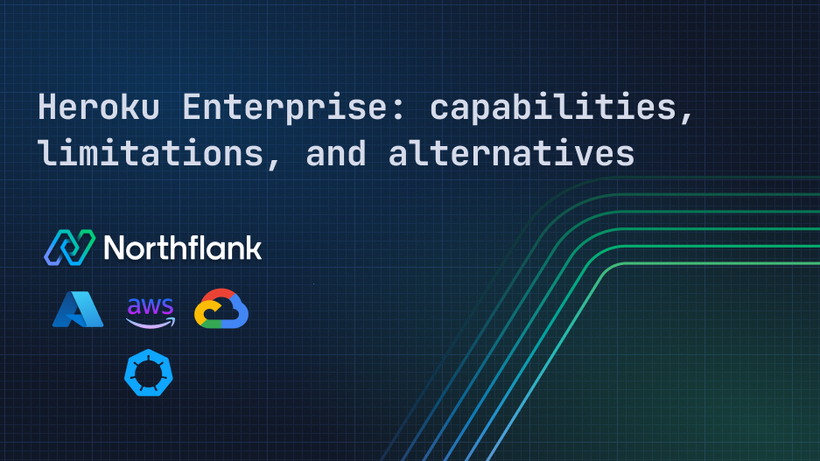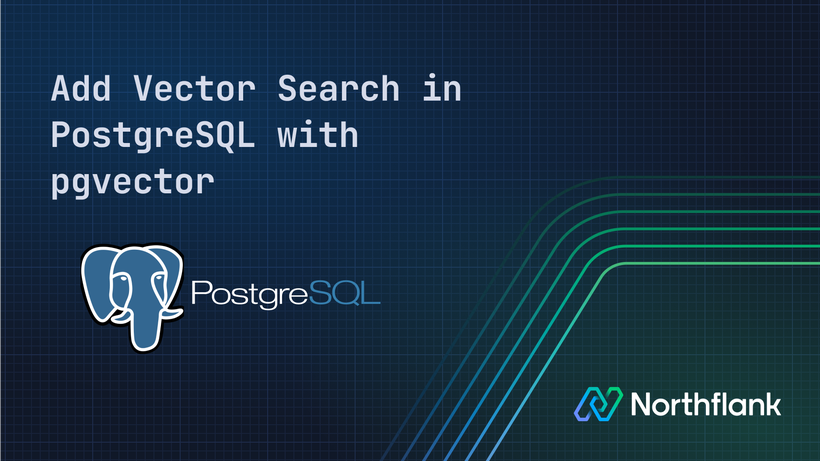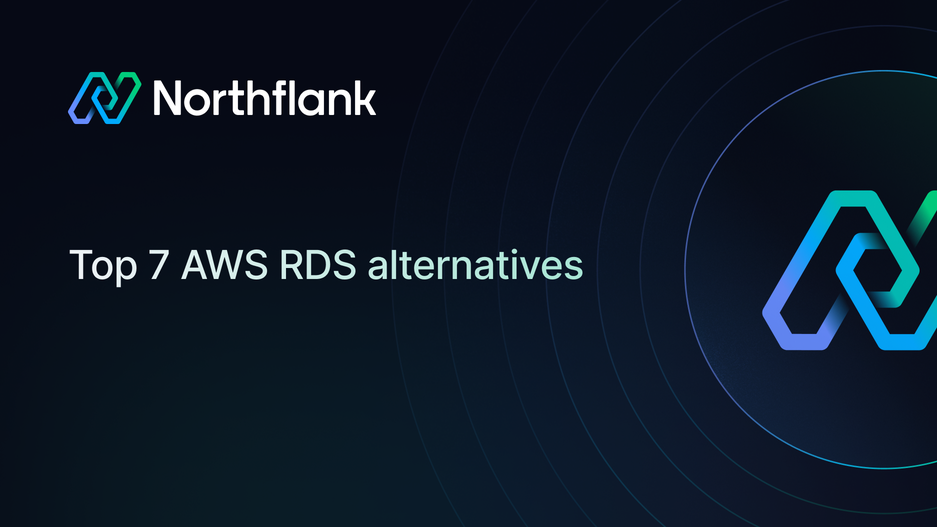

Top 7 AWS RDS alternatives in 2026
AWS RDS alternatives are gaining momentum as development teams search for more cost-effective, flexible, and developer-friendly database solutions.
While Amazon RDS has been a reliable managed database service since 2009, escalating costs, complex pricing structures, AWS vendor lock-in, and limited deployment flexibility are pushing organizations to evaluate alternatives.
If you're paying $80-$1,000+ monthly for AWS RDS or struggling with unpredictable bills and AWS-only deployment, this guide compares the top alternatives to help you make an informed decision.
See a quick list of the top 7 AWS RDS alternatives we'll review in this guide:
- Northflank - Best for startups to enterprise teams wanting managed databases with multi-cloud flexibility, transparent pricing, auto-scaling, and modern DevOps features. Deploy PostgreSQL and MySQL on AWS, GCP, Azure, Oracle Cloud, Civo, or bare-metal from a single platform with built-in CI/CD, preview environments, and significant cost savings compared to RDS.
- Google Cloud SQL - Best for teams using the Google Cloud Platform needing native GCP service integration
- Neon - Best for serverless PostgreSQL with database branching capabilities
- Supabase - Best for full-stack developers needing database, auth, and real-time APIs
- Azure Database for PostgreSQL - Best for organizations standardized on Microsoft Azure infrastructure
- DigitalOcean Managed Databases - Best for small businesses wanting predictable costs and simple management
- Railway - Best for side projects and rapid prototyping with simple setup
When evaluating AWS RDS alternatives, focus on these key criteria:
- Cost transparency - Look for clear, usage-based pricing without hidden fees for backups, monitoring, or networking. Pricing calculators should accurately predict costs, and you should be able to pause development databases to save money.
- Deployment flexibility - Modern teams need multi-cloud options (AWS, GCP, Azure) from a single platform. Bring Your Own Cloud (BYOC) lets you maintain existing cloud relationships while gaining managed convenience.
- Developer experience - The best alternatives provide intuitive interfaces, CLI/API support, Git-based workflows, preview databases for pull requests, and unified application and database deployment rather than separate tools.
- Performance and scaling - Evaluate both vertical and horizontal scaling capabilities, auto-scaling features, connection pooling for high-connection workloads, and whether serverless or scale-to-zero options fit your needs.
- Security and compliance - Production databases require automated backups with point-in-time recovery, high availability with automatic failover, encryption, network isolation, fine-grained access controls, and relevant compliance certifications (SOC 2, ISO 27001, HIPAA, PCI-DSS).
We've evaluated the following alternatives based on cost-effectiveness, deployment flexibility, developer experience, performance, and scalability to help you find the best fit for your requirements.
Northflank delivers a modern cloud platform combining managed database simplicity with multi-cloud flexibility and transparent pricing. Built for teams in need of AWS RDS alternatives without vendor lock-in, Northflank lets you deploy managed databases, including PostgreSQL, MySQL, MongoDB, Redis, MinIO, and RabbitMQ, across multiple clouds from a unified platform.
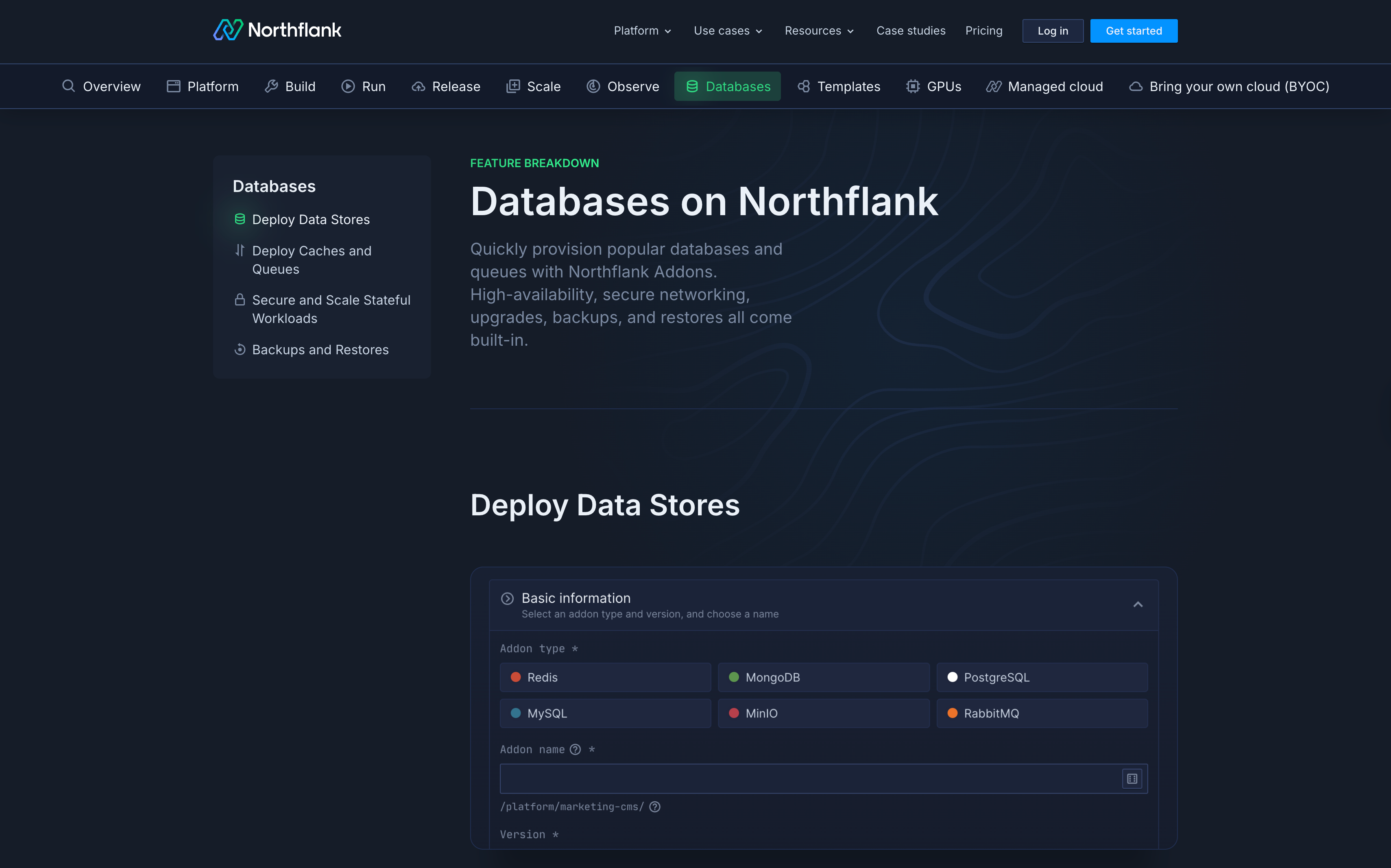
Key features:
- Multi-cloud deployment - Deploy databases on AWS, GCP, Azure, Oracle Cloud, Civo, or bare-metal from a single platform. Choose from 30+ global regions without vendor lock-in. Run on Northflank's managed cloud or bring your own cloud account (BYOC) to maintain existing cloud relationships and billing.
- Transparent, predictable pricing - Reduce costs compared to AWS RDS with simple usage-based pricing. Pay per-second for only CPU, memory, and storage you consume with no hidden fees. Managed databases including PostgreSQL, MySQL, MongoDB, and Redis start from as low as $3.91/month. Pause development databases to save costs during inactive periods.
- Flexible scaling - Scale horizontally with read replicas and vertically starting from 0.1 vCPU and 256 MB memory. Adjust resources without downtime. Support for PostgreSQL extensions (pgvector, PostGIS, timescaledb) and MySQL configurations.
- Developer-first workflows - Git-based deployments with automatic builds on every commit. Preview databases for pull requests to test schema changes safely. Fork databases for testing. Connect locally using Northflank CLI proxy without exposing databases publicly.
- Unified platform - Deploy databases alongside applications, APIs, background jobs, and CI/CD pipelines on the same platform. Create ephemeral environments for every pull request with databases and applications together.
- Built-in observability - Real-time log tailing with filtering and search. Performance metrics for CPU, memory, network, IOPS displayed in intuitive dashboards. Configure alerts via Slack, email, or webhooks. No separate monitoring tools needed.
- Automated backups and recovery - Daily automated backups with configurable retention. Create manual backups before major changes. Restore to any point in time or from specific backups. Import backups from URLs, files, or connection strings.
- Enterprise-ready security - Private networking between services removes the need for complex VPC configurations. TLS/SSL encryption enabled by default. Fine-grained role-based access controls. Deploy in your own Kubernetes clusters (EKS, GKE, AKS) for maximum control. 24/7 enterprise support with SLAs available.
Pricing:
- Free sandbox - 2 free databases, 2 free services, 2 free cron jobs with always-on compute
- Pay-as-you-go - Self-service with minimal restrictions (Only pay for consumption, infinitely scalable, 6+ cloud regions, 600 BYOC regions, Deploy with CPU & GPU)
- Enterprise plan - SSO, audit logs, on-premises deployment, global backups, HA/DR, dedicated support with SLAs, hybrid cloud across AWS, GCP, Azure, and more.
Use the pricing calculator for exact cost estimates.
Why choose Northflank:
Northflank addresses major AWS RDS pain points:
- Cost predictability - Transparent usage-based pricing with per-second billing for CPU, memory, and storage consumed
- Multi-cloud freedom - Deploy anywhere without AWS lock-in while maintaining managed convenience
- Simplified operations - Deploy production-ready databases quickly vs RDS's complex VPC and security group setup
- Unified developer experience - Manage databases with applications using Git workflows and preview environments instead of piecing together multiple AWS services
- Enterprise flexibility - BYOC (Bring Your Own Cloud) deployment on your AWS, GCP, Azure, Oracle Cloud, Civo, or bare-metal infrastructure maintains your cloud commitments while gaining superior management
Learn more: Managed PostgreSQL | Managed MySQL | Managed Redis | MongoDB Hosting | Deployment guides
Google Cloud SQL provides fully managed PostgreSQL, MySQL, and SQL Server on GCP infrastructure with native service integration.
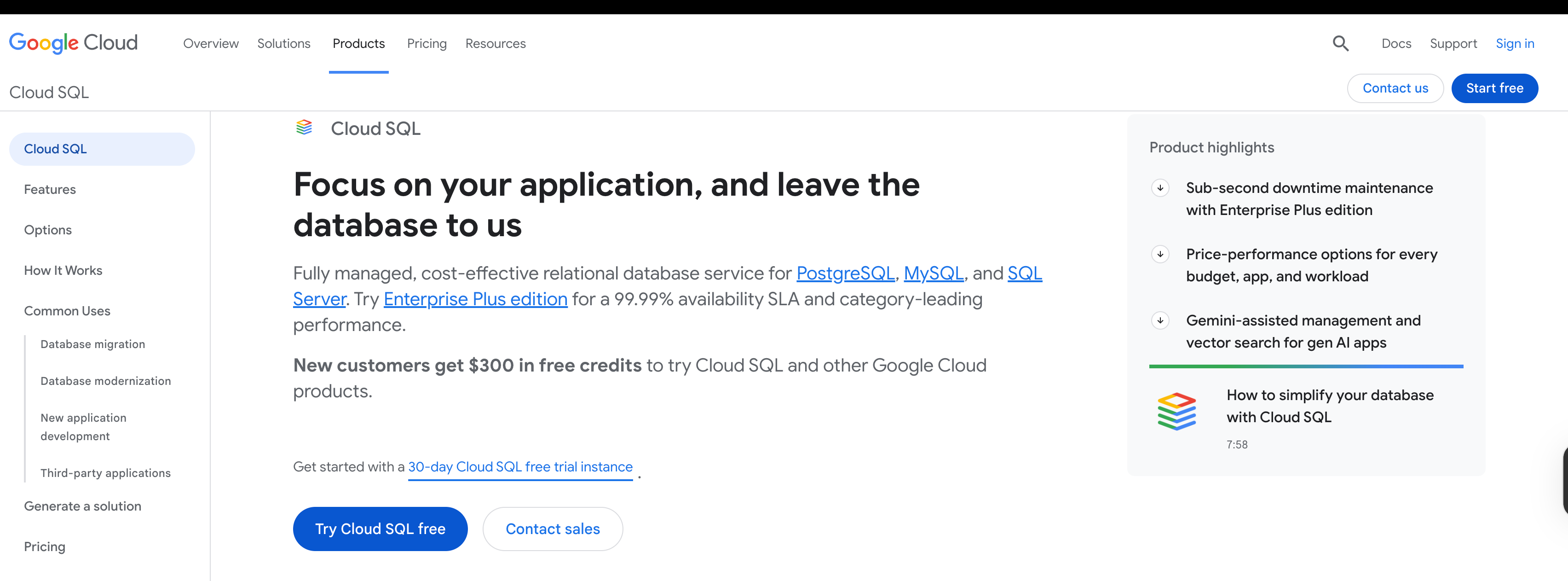
Key features:
- 99.95% SLA with automatic failover
- Native integration with Cloud Run and BigQuery
- Automatic storage scaling
- Point-in-time recovery
- Cloud SQL Insights for performance monitoring
Best for: Teams building on Google Cloud Platform needing GCP service integration and leveraging Google's global network.
Considerations: Pricing increases significantly for larger instances. GCP-only deployment creates vendor lock-in. Less extensive PostgreSQL extension support.
Neon offers serverless PostgreSQL with separated storage and compute architecture enabling database branching and scale-to-zero.

Key features:
- Auto-scale to zero when inactive with sub-second cold starts
- Database branching for testing
- Built-in connection pooling
- Automatic storage scaling
- Time travel queries
Best for: Development teams needing ephemeral databases, applications with sporadic traffic, and teams wanting database branches in Git workflows.
Considerations: Relatively new platform with smaller ecosystem. Cold starts may not suit latency-sensitive applications. PostgreSQL only.
Supabase provides PostgreSQL as the foundation with integrated backend services including auth, storage, and real-time functionality.

Key features:
- Real-time database subscriptions
- Auto-generated REST and GraphQL APIs
- Integrated authentication system
- Built-in file storage
- Full PostgreSQL access
Best for: Full-stack developers building web/mobile apps wanting integrated backend platform and Firebase-like functionality with PostgreSQL.
Considerations: Coupled architecture may not suit teams preferring separation of concerns. Self-hosting requires significant DevOps expertise.
Microsoft Azure's managed PostgreSQL with enterprise features and deep Microsoft ecosystem integration.

Key features:
- Zone-redundant high availability
- Hyperscale with Citus for horizontal scaling
- Advanced threat protection
- Hybrid capability with Azure Arc
- Microsoft ecosystem integration
Best for: Organizations on Azure infrastructure, enterprises needing Microsoft integrations, and teams with hybrid cloud architectures.
Considerations: Azure-only deployment creates vendor lock-in. Complex pricing with multiple components. Some features limited to specific tiers.
DigitalOcean provides managed databases for PostgreSQL, MySQL, MongoDB, and Redis.

Key features:
- Daily automated backups with point-in-time recovery
- High availability with standby nodes
- Vertical scaling through interface
- SSD-backed storage
Best for: Small to medium businesses wanting predictable costs and management without enterprise complexity.
Considerations: Limited to DigitalOcean datacenters. Fewer advanced features than major cloud providers. Less suitable for enterprises.
Railway offers developer-focused database deployment with emphasis on rapid setup.

Key features:
- Database deployment through web interface or CLI
- Git-based deployment with automatic builds
- Built-in metrics dashboard
- Database forking for testing
- CLI and web interface
Best for: Side projects, personal applications, and rapid prototyping where setup speed matters most.
Considerations: Railway-only infrastructure with no multi-cloud. Pricing can increase for production workloads. Smaller community and ecosystem.
Use this comparison to identify which alternative aligns best with your specific requirements, budget, and technical constraints.
| Alternative | Best for | Key advantages | Deployment options |
|---|---|---|---|
| Northflank | Teams wanting multi-cloud flexibility, cost savings vs RDS, avoiding vendor lock-in, unified app+database platform, Git-based workflows, preview environments, enterprise BYOC deployment | Multi-cloud deployment, unified platform with CI/CD, transparent per-second billing, BYOC option, no vendor lock-in, database forking, automated backups | AWS, GCP, Azure, Oracle Cloud, Civo, bare-metal |
| Google Cloud SQL | GCP-focused teams | Native GCP integration, 99.95% SLA, automatic storage scaling | GCP only |
| Neon | Variable workloads, development environments | Serverless auto-scaling, database branching, scale-to-zero | Neon cloud |
| Supabase | Full-stack developers | Integrated backend with auth, real-time, and auto-generated APIs | Supabase cloud, self-hosted |
| Azure Database | Microsoft ecosystem | Azure integration, hybrid cloud support, Hyperscale with Citus | Azure only |
| DigitalOcean | Small businesses | Predictable fixed pricing, vertical scaling | DigitalOcean datacenters |
| Railway | Side projects, prototyping | Git-based deployment, quick setup | Railway cloud |
For teams facing escalating AWS RDS costs, vendor lock-in, or wanting modern DevOps capabilities, evaluating alternatives can deliver significant benefits.
Northflank provides the smoothest path forward, offering managed database simplicity with multi-cloud flexibility, transparent pricing, and comprehensive infrastructure management. Teams typically achieve significant cost savings while gaining better developer experience and deployment options.
Get started with Northflank:
- Start with a free sandbox - 2 free databases, always-on compute
- Book a demo with an expert engineer
- Calculate savings with the pricing calculator
- Learn more: Managed PostgreSQL | Managed MySQL | Managed Redis | MongoDB Hosting | Deployment guides
